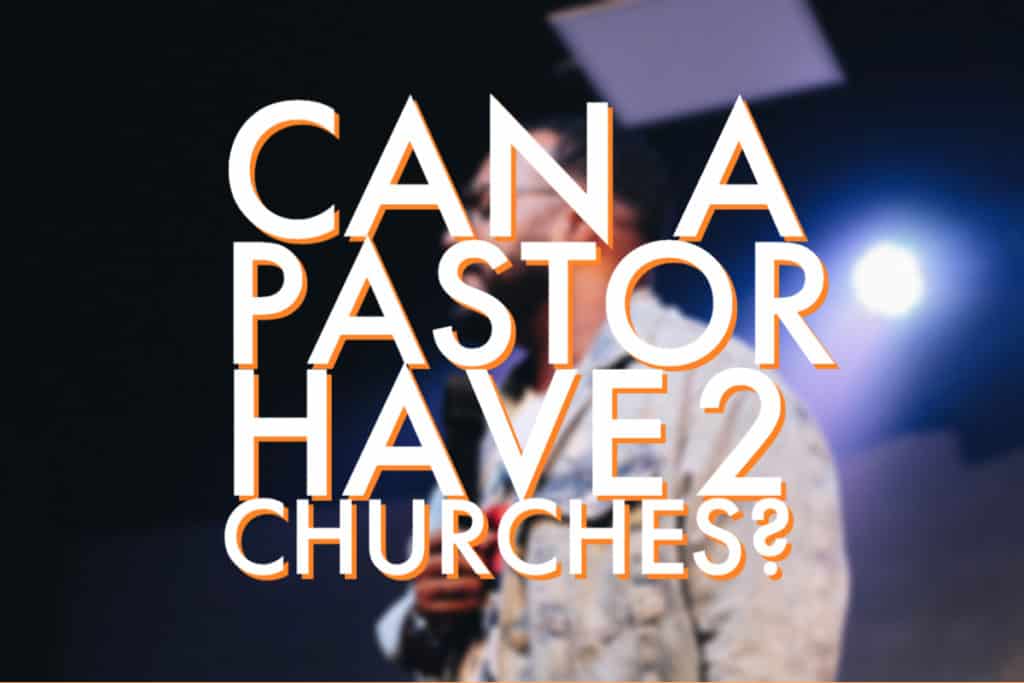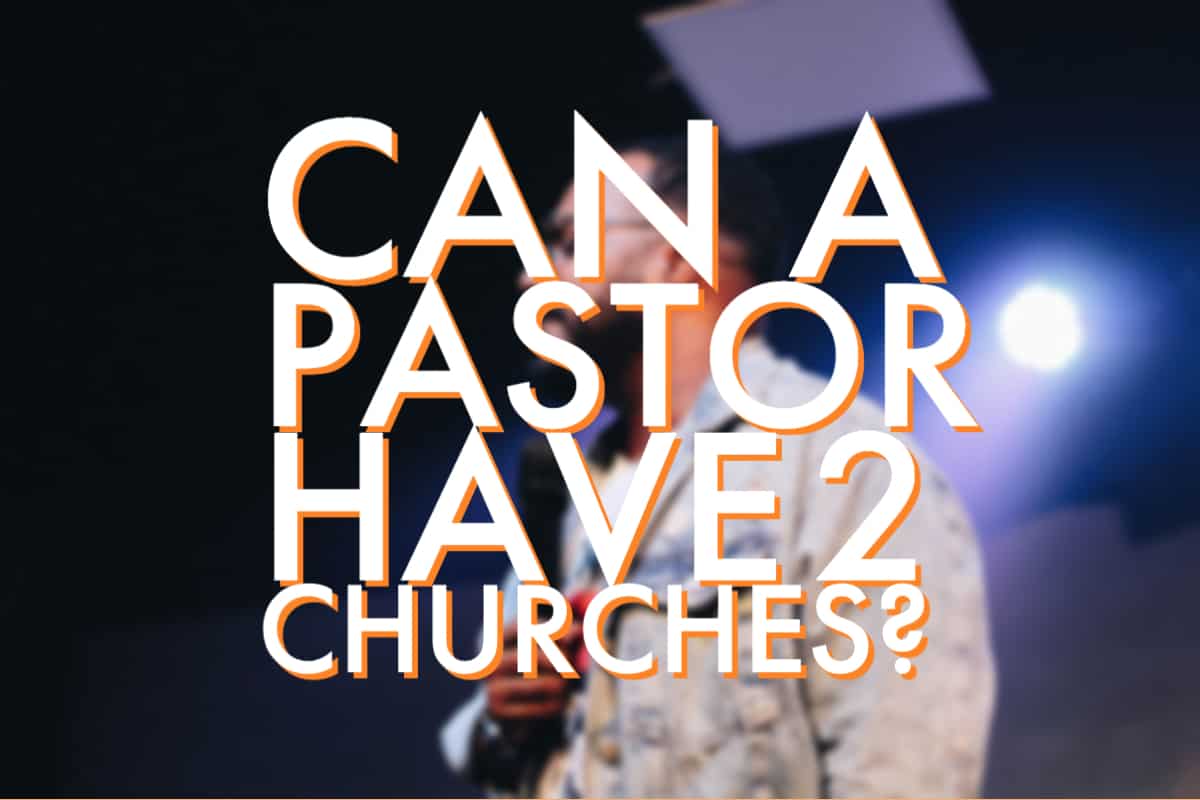
The idea of a multi-church pastor is something that pops up from time to time and it begs the question, can a pastor have more than one church under their care. A pastor can lead more than one church, however, this will usually lead to diminishing results for each additional church, if not total burnout of the pastor.
This question comes along with some assumptions and presuppositions. I will do my best to address them throughout this post.
Assumptions made about these pastors:
- We are speaking of head pastors
- We are speaking of sperate churches, not satellite or sister churches
- We are approaching this more theologically than logistically
What is the purpose of a pastor
A head pastor is a person that is ultimately responsible for the leadership, teaching, and direction of a local church. This position is covered throughout the New Testament but, Titus and 1 Timothy cover these specifications and duties pretty thoroughly.
Leadership of the body
The pastor of a church is to take on the responsibility of the flock.
Pay careful attention to yourselves and to all the flock, in which the Holy Spirit has made you overseers, to care for the church of God, which he obtained with his own blood.
Acts 20:28 ESV
While proper leadership may seem like a simple task for some. This is a direct command from God to lead the members of the church towards sanctification.
Pastoral leadership includes direct and indirect leadership and stewardship. This is where the divided mind and attention of a pastor can lead to issues down the road for both churches.
Direct Pastoral Leadership
Direct pastoral leadership is what you would initially think of when you think of leadership. The head of the church preaching, teaching, and admonishing the flock to lead them towards sanctification. This is done usually through the “church stuff” such as Sunday services and midweek discipleship studies.
By splitting time between churches a pastor wouldn’t necessarily let the teaching drop at either location. However, the teaching would only be given half of the time or would have to be used in a rerun format. In some instances this will lead to the second church to feel just like that… a “second church”.
Indirect Pastoral Leadership
The parenting saying of “more is caught than taught”, holds true in this area of leadership as well. Many times throughout the week a pastor will interact with the congregation in various forms or fashions. This is often where the leadership through fellowship can truly shine. While the idea of “osmotic sanctification” isn’t very theologically sound, the process of surrounding yourself with like-minded people with lead to more like-minded thinking.By just being a good role model for the men in the church a pastor can have an exponential increase in their impact throughout the body.
Indirect pastoral leadership is where most of the issues arise from a split-church pastor. By the very necessity of only being available half of the time, a church will have a less personal interaction with the pastor. This lack of fellowship can propel some pastors into more of a public speaker, as compared to a shepherd.
Teaching of the Word
Teaching the Word of God should be the #1 priority for the head pastor of a church. Many of the other “pastor duties” can be handed off to associate pastors or elders within the church, but the preaching on Sunday morning is where a pastor’s teaching can truly shine.
Preach the word; be ready in season and out of season; reprove, rebuke, and exhort, with complete patience and teaching.
2 Timothy 4:2 ESV
Teaching the Word happens throughout the week at most churches. Often the Sunday Service will take a pastor 15-30 hours to prepare and outline a sermon (pastoralized has a great survey on this). If there is a responsibility to also prepare a midweek study on top of “pastoral duties”, you can quickly see where the work week goes for most pastors. Now if all of this work were to be doubled… You are quickly looking to achieve burn out in the pulpit.
Direction of the church
Churches will normally fall into one of two camps, either fully pastor lead or elder board lead. In both cases the pastor is usually a big contributor to the church direction and management.
Shepherd the flock of God that is among you, exercising oversight, not under compulsion, but willingly, as God would have you; not for shameful gain, but eagerly; not domineering over those in your charge, but being examples to the flock.
1 Peter 5:2-3 ESV
It is clear that the Bible places the responsibility of caring for and stewarding the church directly on the shoulders of the pastor. Everything from finance, facilities, or personnel, will pass across the pastor’s desk at some point. It is rare that even a fully autonomous elder’s board will make a major decision without pastoral input.
Keeping in mind the involvement needed by most pastors to keep the church on course, again, splitting the attention and capabilities of the pastor will lead to burnout or failure.
What is the purpose of the church
The purpose of the church is not to serve the pastorate. The pastor is to serve the church and assist the church in many of its basic functions such as to:
- Bring together believers to learn more about Christ
- Evangelize to the unsaved
- Work together in sanctification
- Assisting each other in life
Often the term “doing life together” gets thrown around, but it is very applicable in this case. The church is to join together regularly to learn and fellowship according to the New Testament.
And all who believed were together and had all things in common. And they were selling their possessions and belongings and distributing the proceeds to all, as any had need. And day by day, attending the temple together and breaking bread in their homes, they received their food with glad and generous hearts, praising God and having favor with all the people. And the Lord added to their number day by day those who were being saved.
Acts 2:44-47
When a pastor is dividing his time between more than one church family, there will inevitably be some lack of familiarity within that church family. While this won’t take away from the preaching and teaching, it will damage the counseling, discipleship, and mentoring of the church members.
“I have personally seen a lack of pastoral fellowship within the church, lead to discord within a former church I attended. “
Josh
In summary, can a pastor have more than one church?
It is allowed and in some cases even common practice to have a pastor with more than one church. However, this practice will lead to an overworked and undersupported pastor, as well as more than one underserved church. Instead of asking, “can a pastor have 2 churches”? The better question is “should a pastor have more than one church”.
What does the Bible say about the pastor’s role
Here are some common verses that talk about what a pastor’s role and qualifications are.
Acts 20:28 ESV
Pay careful attention to yourselves and to all the flock, in which the Holy Spirit has made you overseers, to care for the church of God, which he obtained with his own blood.
Romans 16:17 ESV
I appeal to you, brothers, to watch out for those who cause divisions and create obstacles contrary to the doctrine that you have been taught; avoid them.
Ephesians 4:12 ESV
To equip the saints for the work of ministry, for building up the body of Christ,
1 Timothy 3:2-3 ESV
Therefore an overseer must be above reproach, the husband of one wife, sober-minded, self-controlled, respectable, hospitable, able to teach, not a drunkard, not violent but gentle, not quarrelsome, not a lover of money.
1 Timothy 5:17 ESV
Let the elders who rule well be considered worthy of double honor, especially those who labor in preaching and teaching
2 Timothy 2:15 ESV
Do your best to present yourself to God as one approved, a worker who has no need to be ashamed, rightly handling the word of truth.
2 Timothy 4:2 ESV
Preach the word; be ready in season and out of season; reprove, rebuke, and exhort, with complete patience and teaching.
Titus 1:5-9 ESV
This is why I left you in Crete, so that you might put what remained into order, and appoint elders in every town as I directed you— if anyone is above reproach, the husband of one wife, and his children are believers and not open to the charge of debauchery or insubordination. For an overseer, as God’s steward, must be above reproach. He must not be arrogant or quick-tempered or a drunkard or violent or greedy for gain, but hospitable, a lover of good, self-controlled, upright, holy, and disciplined. He must hold firm to the trustworthy word as taught, so that he may be able to give instruction in sound doctrine and also to rebuke those who contradict it.
Hebrews 13:17 ESV
Obey your leaders and submit to them, for they are keeping watch over your souls, as those who will have to give an account. Let them do this with joy and not with groaning, for that would be of no advantage to you.
1 Peter 5:1-4 ESV
So I exhort the elders among you, as a fellow elder and a witness of the sufferings of Christ, as well as a partaker in the glory that is going to be revealed: shepherd the flock of God that is among you, exercising oversight, not under compulsion, but willingly, as God would have you; not for shameful gain, but eagerly; not domineering over those in your charge, but being examples to the flock. And when the chief Shepherd appears, you will receive the unfading crown of glory.





